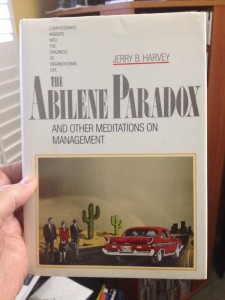Podcast: Play in new window | Download (Duration: 16:21 — 15.0MB)
Subscribe: Apple Podcasts | Spotify | RSS | More
It doesn’t’ happen often. In fact, I’ve gone on record that in all my years of serving leaders I’ve only encountered one client who was utterly disagreeable to be helped. But that doesn’t mean all of us don’t encounter times – perhaps just moments – where we’re resistant to asking for, or accepting help even though we know we could use it.
Why? Let me give you the 2 biggest reasons I’ve discovered in helping people.
Pride. Leaders and executives have pride. Not necessarily the harmful kind – arrogance and hubris. Mostly, good leaders have pride in themselves, their accomplishments, and their future prospects. Great leaders have pride in their teams and organizations.
The downside is that this positive pride can make us resistant to vulnerability. The whole “never let ’em see you sweat” mindset that we so often need works against us in these moments where we could likely experience some significant growth. We’re not accustomed to turning it ON and OFF, so turning our pride down enough to see the safety that can exist with somebody who can help us…it’s difficult. It requires a firm commitment to our own growth and improvement. Only when our growth matters more than our pride will we likely submit ourselves to the vulnerability necessary for the task of personal and professional growth.
Lack of safety. More than any single thing I’ve had clients tell me of all the times they sought or would have accepted help, but the right person never showed up. Those who did show up weren’t safe enough for them to fully open up. Mostly, clients report a boss who attempted to coach them and they simply felt it was a no-win situation for them. I know much is written about how we must coach our employees at work. And I agree. But there is a specific kind of coaching that very few bosses can successfully pull off – the kind that is personal enough to really move the needle. You could survey every client I’ve ever served and I guarantee 100% of them (save one 😉 ) would readily tell you that their biggest breakthroughs happened when they were most vulnerable. Not when they were least vulnerable. But they’d also tell you that they felt completely safe with me. It’s the advantage of professional coaches who have no other dog in the hunt other than helping the client excel. I don’t bring any baggage to the relationship. There’s nothing the client owes me, other than their best effort to their own growth and improvement. And they basically don’t owe me that, but they owe that to themselves!
So what can we do if we’re determined to grow and improve?
One, make up your mind.
Your determination to improve is the most important ingredient. Nothing can replace it. Until you fully commit yourself to your own growth and improved success, nothing else matters. Tactics. Strategies. Collaboration. None of it will make any difference until you are fully vested in your future potential being realized.
Two, jettison excuses. Accept responsibility.
Second, only to the first is this one – to get rid of all the blaming and excuse-making. Included in this is to get rid of living in the past.
Sometimes we can make up our mind that we’d like to improve, but we’re cursed with some lingering issues of being victims. It’s so easy to do. To relive all the woes of our past and find excuses why we played no part in it. Even easier is to never forget all the injustices or ill-treatment we endured. It helps us explain some of our current challenges. We’re the way we are because back years ago we had to endure certain things. That becomes our excuse for why we’re still engaged in some behaviors that may not be serving us so well.
My coaching is intently focused on helping clients paint themselves into the corner where all the excuses go away. It’s the only place where any of us can truly achieve growth. I call it a corner because only when our backs are against the wall will we realize there’s only one way to go – forward. And forward only happens when we suck all the oxygen out of the room filled with our excuses. Like fire, our excuses need fuel. As long as give it to them, they thrive and spread. Once we willingly put ourselves in the corner where we can no longer use them, we begin to deprive them of the food they need to survive. In my experience, almost all clients find a pivotal moment – a place they come to – where they resign themselves to “no more excuses.” The quicker we surrender to responsibility and accountability, the quicker our excuses die…the faster our progress!
Are you to blame for everything that has happened to you? No, of course not. We’re all subjected to people and circumstances beyond our control. Even so, we must accept responsibility for our own lives because the alternative is unacceptable for every high achiever – to be a pawn in life, unable to impact anything that happens to us. Far better to look at our life as being in our control to do whatever we can to influence the outcome – what I call, “our ideal outcome.”
Three, figure out your ideal outcome. Pursue it vigorously.
This is among the chief reasons it can be tough to find a safe person. It’s also THE key reason why professional coaching works.
Bosses who seek to mentor or coach have an ideal outcome associated with your career. They want and need things from you. Nothing wrong about that, it’s just how it is.
Friends who might be filled with advice have another ideal outcome for you – and for themselves. They want to be your friend and will likely tread carefully to challenge you.
What you most need is compassionate challenges from somebody who has no vested interest in your outcome except you achieving your very best. That’s why safe people are hard to find. People who aren’t beholden to you for anything other than for you to achieve what you most want!
Clients often find this part of the process more difficult than they first imagined. It’s much easier to enumerate what you don’t want, but to hone in on what you most want – your ideal outcome – can be hard. Especially since many of us haven’t really put in the work to figure that out.
What do you most want to happen?
What weaknesses do you most want to remedy?
What strengths do you most want to leverage even more?
What outcome – what result – do you most want? Right now?
Having a safe guide to help us figure that out is powerful. Until we know exactly what we’re aiming for, then we can blindly strive for things we may not fully want.
 Have you ever found yourself pursuing something you really didn’t want? Something you felt others may have wanted for you? It’s likely everybody has known that experience. Few things are more disappointing than reaching a destination you never really wanted. It’s the Abilene Paradox.
Have you ever found yourself pursuing something you really didn’t want? Something you felt others may have wanted for you? It’s likely everybody has known that experience. Few things are more disappointing than reaching a destination you never really wanted. It’s the Abilene Paradox.
On a hot afternoon visiting in Coleman, Texas, the family is comfortably playing dominoes on a porch, until the father-in-law suggests that they take a [50-mile] trip to Abilene for dinner. The wife says, “Sounds like a great idea.” The husband, despite having reservations because the drive is long and hot, thinks that his preferences must be out-of-step with the group and says, “Sounds good to me. I just hope your mother wants to go.” The mother-in-law then says, “Of course I want to go. I haven’t been to Abilene in a long time.”
The drive is hot, dusty, and long. When they arrive at the cafeteria, the food is as bad as the drive. They arrive back home four hours later, exhausted.
One of them dishonestly says, “It was a great trip, wasn’t it?” The mother-in-law says that, actually, she would rather have stayed home, but went along since the other three were so enthusiastic. The husband says, “I wasn’t delighted to be doing what we were doing. I only went to satisfy the rest of you.” The wife says, “I just went along to keep you happy. I would have had to be crazy to want to go out in the heat like that.” The father-in-law then says that he only suggested it because he thought the others might be bored.
The group sits back, perplexed that they together decided to take a trip which none of them wanted. They each would have preferred to sit comfortably, but did not admit to it when they still had time to enjoy the afternoon.
Be careful where you go. Make sure it’s where you most want to go. And remember, it’s always wiser to run toward something than away from something.
Be a leader. Let it begin with leading yourself toward an improved version of yourself.
Be well. Do good. Grow great!

 About the hosts: Randy Cantrell brings over 4 decades of experience as a business leader and organization builder. Lisa Norris brings almost 3 decades of experience in HR and all things "people." Their shared passion for leadership and developing high-performing cultures provoked them to focus the Grow Great podcast on city government leadership.
About the hosts: Randy Cantrell brings over 4 decades of experience as a business leader and organization builder. Lisa Norris brings almost 3 decades of experience in HR and all things "people." Their shared passion for leadership and developing high-performing cultures provoked them to focus the Grow Great podcast on city government leadership.
The work is about achieving unprecedented success through accelerated learning in helping leaders and executives "figure it out."
